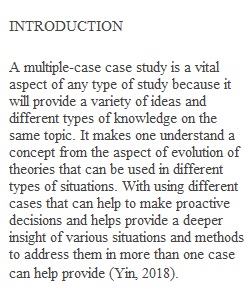


Q Multiple-case case studies allow the researcher to use replication logic to evaluate the theoretical propositions and strengthen the findings of the studies. In this discussion, the example of a multiple-case study would be the culture of compliance to environmental regulations within investor-owned electrical utilities, local municipal electric utilities, and federal electrical utilities. The application of the same case study construct to the three distinct types of electrical utilities allows the researcher to show potential trends of similarity or differences. The researcher is then able to compare the trends and findings against the theoretical propositions to determine the validity of the study. The synthesizing of the data across three separate types of utilities allows the researcher to address outlier and rival explanations as a part of the research findings. As a consultant to the Kansas state leadership, the student will discuss what this Multiple-Case Case Study brings to bear on the source selection of the electricity provider for the state. The student must specifically speak to the application of a couple of business solutions (i.e. does this study identify a single solution or could it be parlayed into a range of solutions, do the outcomes of this study bring a scalable solution, what’s the difference between this and a simple business case analysis or cost benefit analysis, etc.)
View Related Questions